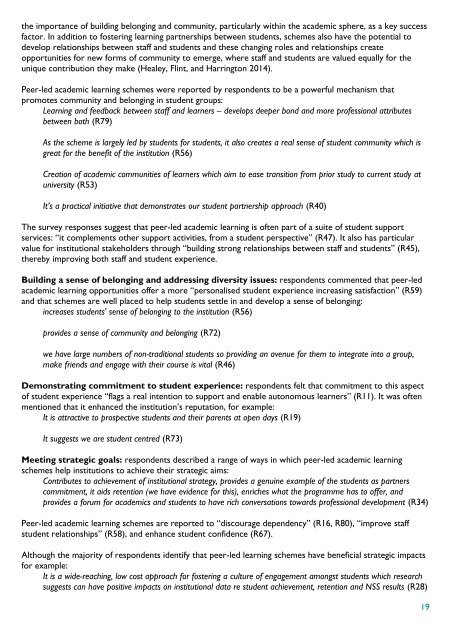Peer_led_learning_Keenan_Nov_14-final
Peer_led_learning_Keenan_Nov_14-final
Peer_led_learning_Keenan_Nov_14-final
Create successful ePaper yourself
Turn your PDF publications into a flip-book with our unique Google optimized e-Paper software.
the importance of building belonging and community, particularly within the academic sphere, as a key successfactor. In addition to fostering <strong>learning</strong> partnerships between students, schemes also have the potential todevelop relationships between staff and students and these changing roles and relationships createopportunities for new forms of community to emerge, where staff and students are valued equally for theunique contribution they make (Healey, Flint, and Harrington 20<strong>14</strong>).<strong>Peer</strong>-<strong>led</strong> academic <strong>learning</strong> schemes were reported by respondents to be a powerful mechanism thatpromotes community and belonging in student groups:Learning and feedback between staff and learners – develops deeper bond and more professional attributesbetween both (R79)As the scheme is largely <strong>led</strong> by students for students, it also creates a real sense of student community which isgreat for the benefit of the institution (R56)Creation of academic communities of learners which aim to ease transition from prior study to current study atuniversity (R53)It’s a practical initiative that demonstrates our student partnership approach (R40)The survey responses suggest that peer-<strong>led</strong> academic <strong>learning</strong> is often part of a suite of student supportservices: “it complements other support activities, from a student perspective” (R47). It also has particularvalue for institutional stakeholders through “building strong relationships between staff and students” (R45),thereby improving both staff and student experience.Building a sense of belonging and addressing diversity issues: respondents commented that peer-<strong>led</strong>academic <strong>learning</strong> opportunities offer a more “personalised student experience increasing satisfaction” (R59)and that schemes are well placed to help students settle in and develop a sense of belonging:increases students' sense of belonging to the institution (R56)provides a sense of community and belonging (R72)we have large numbers of non-traditional students so providing an avenue for them to integrate into a group,make friends and engage with their course is vital (R46)Demonstrating commitment to student experience: respondents felt that commitment to this aspectof student experience “flags a real intention to support and enable autonomous learners” (R11). It was oftenmentioned that it enhanced the institution’s reputation, for example:It is attractive to prospective students and their parents at open days (R19)It suggests we are student centred (R73)Meeting strategic goals: respondents described a range of ways in which peer-<strong>led</strong> academic <strong>learning</strong>schemes help institutions to achieve their strategic aims:Contributes to achievement of institutional strategy, provides a genuine example of the students as partnerscommitment, it aids retention (we have evidence for this), enriches what the programme has to offer, andprovides a forum for academics and students to have rich conversations towards professional development (R34)<strong>Peer</strong>-<strong>led</strong> academic <strong>learning</strong> schemes are reported to “discourage dependency” (R16, R80), “improve staffstudent relationships” (R58), and enhance student confidence (R67).Although the majority of respondents identify that peer-<strong>led</strong> <strong>learning</strong> schemes have beneficial strategic impactsfor example:It is a wide-reaching, low cost approach for fostering a culture of engagement amongst students which researchsuggests can have positive impacts on institutional data re student achievement, retention and NSS results (R28)19


